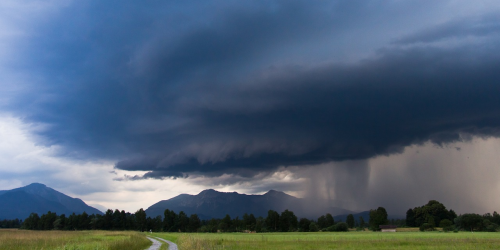

The Adaptation Sciences (AdSci) Program is designed to advance the knowledge, methods and frameworks needed to move society beyond incremental adaptation toward more widespread, connected, adaptive pathways, and resilience strategies with clear economic and societal co-benefits. Research focuses on the integration of acute and chronic stressors that occur over multiple timescales, which can lead to cascading impacts that threaten to overwhelm and undermine systems important to daily life and social and economic well-being. CPO’s AdSci Program is now in its second year of funding. For Fiscal Year 2022 (FY22), the Regional Integrated Sciences and Assessments (RISA) Program and the AdSci program jointly solicited proposals for research projects exploring fiscal pathways for climate adaptation in rural areas across the U.S. The goal of the collaboration is to support innovative social science research that can support successful adaptation across the nation.
Adaptation to climate change in rural areas is important for the direct wellbeing of its residents and local economies. In addition, investments into climate adaptation in rural areas can have an amplified impact, supporting overall national adaptation goals, and extending benefits to adjacent urban areas. Financing climate adaptation efforts in rural areas can be challenging and complex. Rural areas often lack capacity to solicit investments or successfully apply to public or private granting and other funding opportunities. Coupling challenges to investments with fiscal policies can create complex and unique hurdles for supporting adaptation in rural areas. These limitations increase injustices for rural populations who are typically minorities and/or low income status. Proposals to this competition explored both the challenges and opportunities of fiscal pathways for adaptation in rural areas of the U.S. and considered how this knowledge can be used to improve the abilities of rural communities to invest in climate adaptation.
For FY22, AdSci specifically encouraged proposals that focused on climate adaptation in rural communities. The Program received 7 proposals totaling $1,095,041 in grants1. Of this, the 4 projects2 that were funded by the AdSci program are:
- Assessing the Rural Capacity for Climate Adaptation: The First National Validated Index
There is a lack of publicly available data that describes climate adaptive capacity in rural communities in the United States – few studies have been conducted and none with a national scope. This scientific gap creates additional challenges for rural communities attempting to demonstrate their fiscal need for resources to funding agencies. Concurrently, agencies lack data to make more equitable fiscal decisions. The goal of this study is to develop a validated rural climate-adaptive-capacity index for the entire United States and display the results in an online mapping tool while also contributing insights to the academic literature.- PI: Patty Hernandez, Headwaters Economics
- Co-PI(s): Erica Goto, University of Michigan
- Assessing Fiscal Pathways for Meeting the Climate Adaptation Needs of Rural Alaskan Tribes
The fiscal pathways for federal funding of Tribal climate adaptation and mitigation are complex and bureaucratic, and significant obstacles exist for Tribes and rural Indigenous peoples in accessing and effectively implementing these funds. Obstacles to funding and technical assistance are compounded in rural Alaska Native communities by a relatively recent history of colonization; minimal capacity for grant writing; administration and implementation of plans; minimal opportunities for economic development; and a complex jurisdictional and governance system that is responsible for planning, infrastructure, and economic development. While many rural Alaska Native communities are seeking and receiving federal funding for climate adaptation and resilience, obstacles and institutional barriers persist that prevent Tribes and Indigenous peoples from fully benefiting from this funding and fully thriving in the face of disproportionate and acute impacts of a changing climate. This work will potentially offer scientific and practical advances that highlight ways in which Indigenous evaluation can contribute to methods and metrics in assessment of the effectiveness of complex fiscal pathways, and innovate holistic, transdisciplinary research that includes Indigenous knowledge and lived experience. The work aims to incorporate local expertise to address an issue of regional relevance, integrates scientific approaches by incorporating multiple ways of knowing, aims to strengthen and expand existing knowledge to action partnerships, and expands findings of a regional case study to a national network of resilience researchers and adaptation science specialists.- PI: Adelheid Herrmann, University of Alaska
- Co-PI(s): Sarah Trainor, University of Alaska
- Intended and Unintended Consequences of Buyout Programs as an Adaptive Response to Compound Flood Events and Coastal Inundation Risk in Rural Communities
This project will examine the full impact of buyout programs in two rural communities in the Carolinas applying mixed methods to capture the benefits and costs of this adaptation strategy while addressing the fiscal and equity challenges. This study aims to reach out to rural communities so that perspectives and insights of underserved areas could inform state-level planners as they formulate buyout and other mitigation strategies. By identifying policy adjustments that can nudge take-up rates and by describing micro-mitigation adaptations that can be expanded and replicated, this work aims to improve policy efficacy and potentially lower program costs.- PI: Meghan Millea, East Carolina University
- Co-PI(s): Jamie Kruse, East Carolina University, Anuradha Mukherji, East Carolina University, Landon Knapp, College of Charleston, Scott Curtis, The Citadel, Ausmita Ghosh, East Carolina University, Katie Finegan, Coastal Carolina University
- Design Innovative Policy Instruments to Promote Equitable and Effective Low-carbon Energy Infrastructure Investment in Rural Communities
This proposal is aimed at a systematic assessment of the challenges and opportunities related to clean energy infrastructure investments in the rural communities of the U.S. By leveraging the PI’s past and ongoing research on clean energy policy analysis, and environmental/energy justice, this proposal seeks to address several important knowledge gaps, including the justice implications of clean energy transition for rural communities, the effectiveness and distributional impacts of local wind energy ordinances, and the innovative climate adaptation financing mechanism. Results of this project are expected to help policy makers and activists understand inequalities associated with climate adaptation investments in energy systems, and to enable evidence-based policy making. The goal is to support and strengthen the capacity of rural governments to design and implement public policies that promote and fund equitable and sustainable climate adaptation strategies.- PI: Shan Zhou, Michigan Technological University
- Co-PI(s): Warren Leon, Clean Energy States Alliance, Marty Fittante, InvestUP
1The funding will be distributed over the life of the projects and future-year funding is conditional on appropriations.
2 At the time of publication, all awards may not have been accepted by recipient institutions





